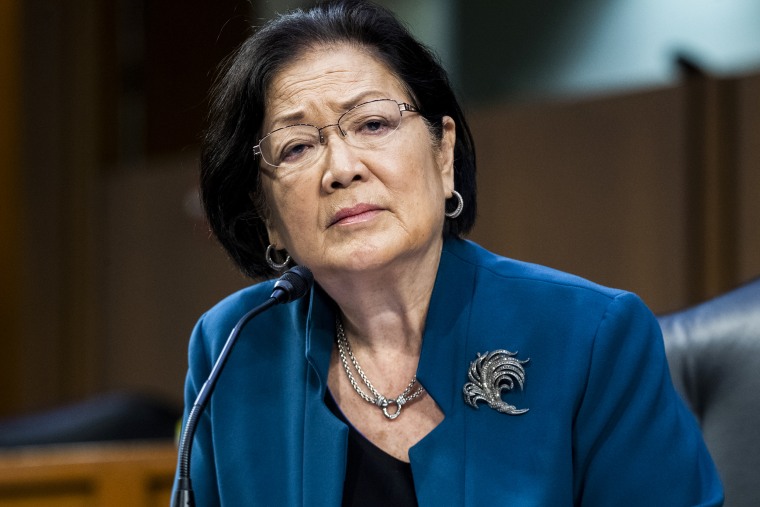Sex trafficking of Native Hawaiian women remains a “huge problem” in Hawaii and it has not received sufficient attention, according to Sen. Mazie Hirono, D-Hawaii.
Hirono has been demanding increased awareness, in addition to federal response, on the sexual exploitation of Native Hawaiian victims. She has been calling for a larger focus on the issue from both the FBI and the Justice Department. Citing data that shows Native Hawaiian women and girls represent 67% to 77% of sex trafficking victims in the state, Hirono said “it is about time” the government take action.
“It is a huge human rights issue,” Hirono told NBC News. “You have categories of people in our country who are particularly being victims of sex trafficking and violence, murder and missing persons.”
According to census data, Native Hawaiian and other Pacific Islander groups make up 10.5% of today's Hawaii’s population. However, they constitute the majority of sex trafficking cases. When looking at child sex trafficking cases, Native Hawaiians represent 37% of victims statewide.
Hirono pointed out that the state has already identified sexual exploitation as a problem across the islands. Last year, the Hawaii State Commission on the State of Women, a government agency aimed at working toward equality for women and girls, established a task force dedicated to addressing the issue. She said, however, that federal agencies like the FBI and the Department of Justice should be looking into these cases as part of the larger efforts to confront the missing and murdered Indigenous people's crisis, she said.
The Justice Department did not respond to NBC News' request for comment.
Hirono, who pressed FBI Director Christopher Wray on the issue during a U.S. Senate Judiciary Committee hearing earlier this month, said that the bureau has no excuse to put off the efforts.
At the time, Wray responded calling the issue “important” and adding that the agency’s Honolulu office had been working to “aggressively pursue federal charges on known and repeat human trafficking offenders.”
“What they tell me is that you’re seeing gangs and drug trafficking organizations exploit vulnerable victims, and in particular, the lion’s share — as you say with the statistics that you were citing — the lion’s share of that is on displaced or marginalized sectors, especially Native Hawaiians,” he said.
But Hirono said that the crimes still require federal attention.
“I said, ‘It would be nice,’ but I meant, ‘Why don’t you do it?’” Hirono said, recounting the exchange. “They don’t need to wait around for a law or change to be made. It’s already legal. These are already legal matters.”
The disproportionate number of Native Hawaiian victims is often overlooked and obscured due to several colliding factors, according to a 2019 report published by the commission and Arizona State University’s Office of Sex Trafficking Intervention. Researchers pointed to geographic isolation from national sex trafficking service resources and tools, and cultural pressure to be silent about experiences of childhood abuse and family violence as just a few of a host of challenges to mitigating the sexual violence in the state. They also wrote that historically, these cases received “scant attention” from local law enforcement.
Researchers wrote that the overthrow of the Kingdom of Hawaii in 1893 and its consequences can be “directly linked” to the overrepresentation of Native Hawaiians in sex trafficking. The invasion led to land dispossession, exposure to sexual violence, hyper-sexualization, cultural dislocation and ongoing inequities, among other serious problems.
“The global and national dimensions of sex trafficking have functioned to obscure the unique and intertwined colonization of bodies and land in Hawaiʻi,” the study reads. “The normalization of human trafficking in Hawaiʻi starting with European and American sailors and soldiers, on plantations, Chinatown and Iwilei has meant that sex trafficking remains a hidden and silent phenomenon or portrayed as an issue affecting only foreign-born women.”
Those who survived sex trafficking found difficulties in the healing process as well. The report points out that many of those who participated in the study were met with a lack of services that comprehended and navigated the sensitivities behind childhood sexual abuse, dating violence, foster care and forced prostitution. They also reported challenges in finding therapists who understood these dynamics as well.
“The resilience of sex trafficking survivors is extraordinary, but it cannot be the only countervailing factor to address this issue,” the research read. “Stories that have been told to these researchers indicate girls and women who have been sex trafficked in Hawaiʻi have endured extreme physical and emotional torture which has adversely affected their adult lives.”
Hirono said that only in recent years have issues surrounding Native Hawaiians and Pacific Islanders drawn more attention, particularly from mainstream audiences. And that’s why issues impacting those communities continue to require proactive, dedicated conversations.
“It’s not going to change overnight. I will continue to push the issue,” she said.
